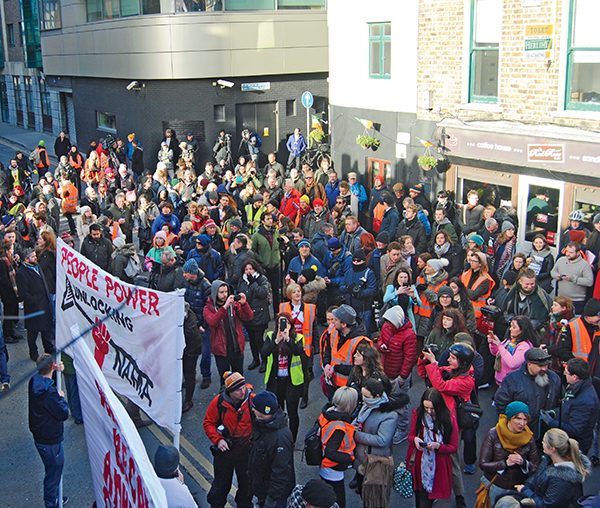
Above: Supporters of Home Sweet Home and Apollo House occupation gather outside.
NewsFour on Tour – In this special report, one of our very own reporters gives a special insight from inside the recent Apollo House occupation during his time of volunteering for the Home Sweet Home campaign.
Much has been said in the mainstream media about Apollo House and the Home Sweet Home campaign, about the occupation of the NAMA building, about the men and women involved in organising the campaign, and about the High Court case that sought to clear the building of the volunteers and homeless residents.
Here I will offer my own view as a volunteer who was at Apollo House as the occupation unfolded from the beginning. Clearly, I am a supporter of Home Sweet Home and the occupation, and of any citizen’s initiative that would seek to assert the rights and entitlements of ordinary people against a political establishment that seems all too often to be pitted against the interests of ordinary people. For this, I no longer make apology.
In my case, the Home Sweet Home campaign all started with a message on Facebook in mid-December; a simple, if slightly mysterious, message from an artist friend that stated a meeting time and location for that very night: December 16th, midnight, outside Mulligan’s pub off Poolbeg Street.
The message said that something had been organised, something big, that artists, housing activists and unions were involved, that a group of dedicated people were finally going to turn the tide and put it up to the banks and vulture funds and their political cronies, that it would give hope and support to people trampled by austerity, debt, homelessness and political neglect… suffice to say that was enough for me. I, like many of the volunteers, jumped at the chance to get involved.
It was a small and eclectic group who gathered late that night at the side entrance to Apollo House opposite the popular out-of-the-way city centre watering hole Mulligan’s.
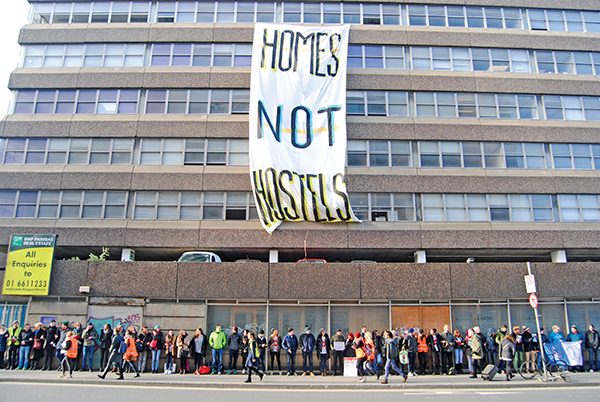
Above: Supporters surround the building.
The atmosphere was electric, some knew what was going on, some didn’t. I hadn’t a clue what was happening and thought it was just going to be the press announcement of some new campaign or other, but there were little or no press people around at that stage.
When word began to filter out among the group that we were going to occupy a building to house the homeless, and that we were taking the vast concrete leviathan of Apollo House that had been a dole office, a revenue office and was now sitting dormant in NAMA receivership, the full magnitude finally started to dawn on us: this would change things, this would be the moment when Irish people would refuse to take lying down any longer the years of misgovernance and neglect by successive governments who had put the interests of financial institutions and political expediency before the basic economic needs of the vast majority of their own people.
The sense that a real movement for positive change was forming in the ashes of 2016 was summed up that night by Home Sweet Home co-founder Dean Scurry when, briefing the remnants of the small but excited assembly before it dispersed some time after 2am, he quoted 1916 leader James Connolly: “The republic I would wish should be of such a character that the mere mention of its name would at all times serve as a beacon light to the oppressed of every land.”
To some of us it seemed that a beacon light that had been dormant for too long was being rekindled as the lights of Apollo House began to flicker on through the cold Dublin night. I put my name down as a Home Sweet Home volunteer the next morning.
The hundreds of volunteers who went through Apollo House during the Home Sweet Home occupation were organised into several main groups: Admin, who organised volunteer rosters, administered funds and generally coordinated the running of the building; the Media Team, who issued press releases for the campaign and dealt with press enquiries, social media etc; Maintenance, who were responsible for the general upkeep of the building dealing also with issues arising with the heating, plumbing and electrics; Security, who oversaw the main gate, regularly patrolled the building, and ensured that only those volunteers and residents currently meant to be in the building were in the building; and Support, who provided care for the residents linking them into other supports and services while addressing residents’ specific needs during their stay in Apollo House.
Having studied Social Care in college a few years ago as a mature student, and having carried out lengthy placements in the community as part of the course, it was deemed that I was best suited as a Support Group volunteer.
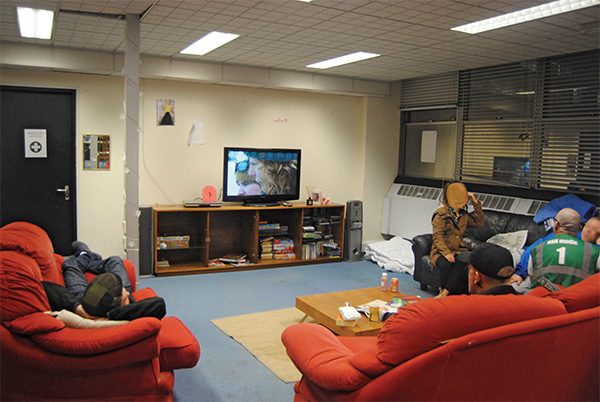
Above: Volunteers and residents relax in the makeshift living room space of Apollo House
My first day volunteering in Support, on the 18th of December, saw me turn up at the heavy gates enclosing the imposing concrete ramp at the side of the building that was to serve as the main entrance during the occupation. Admission was always strictly controlled by security in their distinctive yellow hi-vis vests, so I had to give my name and waited outside the gates while they radioed up to the building to confirm that I was on the current volunteers roster for that shift.
A large fire escape double door off the car park at the top of the ramp (a storey above street level) served as the main entrance to what we in Support called ‘the floor’ or the open area inside the building that served as the residents’ communal area with doors off to the kitchen, a large men’s dormitory and a number of smaller residential rooms for couples and residents with specific needs.
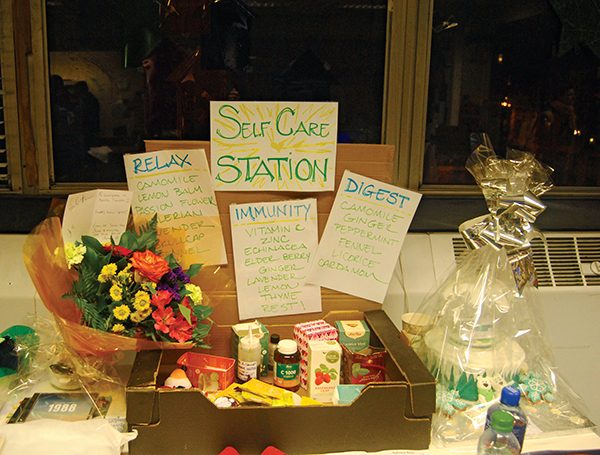
Above: The self-care station inside Apollo House.
If I was under the illusion that social care work was going to be all that I was going to be doing that first evening I was soon put straight; although there had been much work done in advance by volunteers and union members to make the building habitable and comfortable, the operation was still in the process of coming together. A large extra consignment of new beds from key supporter Mattress Mick was due to be delivered and would have to be carried up the outside ramp and a flight of stairs, as would a lorry load of donated metal lockers that would afford residents their own secure storage spaces.
Much of the work in the early days of the occupation was a mix of welcoming residents and hard graft as beds and furniture and donations had to be shifted around the building to furnish new rooms for residents who were presenting themselves to the service in growing numbers. The great dedication and effort of all the volunteers and residents who were willing to muck in and do whatever was required was inspiring, and there was no job too big for us. Wherever possible, residents and volunteers worked as a team, it was never a ‘them and us’ scenario.
The residents who availed of the Apollo House service over Christmas were a diverse group. There were single people in accommodation difficulty – just ordinary-looking folks who didn’t conform to stereotypes of what it is to be ‘homeless’. These people look, talk, dress, act just like any person we might pass on the street. Some had jobs that they were trying to keep going despite their housing predicament.
The thing all of them had in common was that the provision of emergency accommodation was completely unsuitable for their needs. Some spoke of having to stay in dorms in squalid conditions in so-called ‘dry’ (supposedly drink and drug free) hostels where drug use was apparent, where drug paraphernalia was lying around, where there were damp, dilapidated, unsanitary conditions, where it was difficult to sleep due to the fear of theft and assault, or where it was just too noisy and unsettling.
Likewise, there were couples who could not find emergency accommodation in which they could stay together in any dignified manner as couples so as to avail of possibly the only comfort left to them during difficult times: each other.
There were those who were fighting addiction and who found it too difficult and harrowing to be in hostels where drug use was active and apparent, and who needed space and support to help them get well. And then there was the young lad in his twenties just out of prison for minor offences who was fighting heroin addiction but who had been dropped back on the streets with no provision for accommodation, nothing arranged to provide him with his methadone and, basically, little to prevent him from slipping back into a spiral of street drug use and petty crime. He had been made homeless before his prison term through no fault of his own due to the death of his father and the subsequent loss of their council accommodation. He told me that he was delighted to hear of Home Sweet Home in the media, and that he had got a place in Apollo House. The alternative of trying to stay on track fighting against heroin addiction on the street while sleeping in hostels where residents are kicked out every morning was, to say the least, no easy option for him.
One of the great benefits of Apollo House was that residents could stay in the building all day or come and go as they wished. For the duration of its use, Apollo House was the resident’s home, and the service sought to cater to residents’ individual needs.
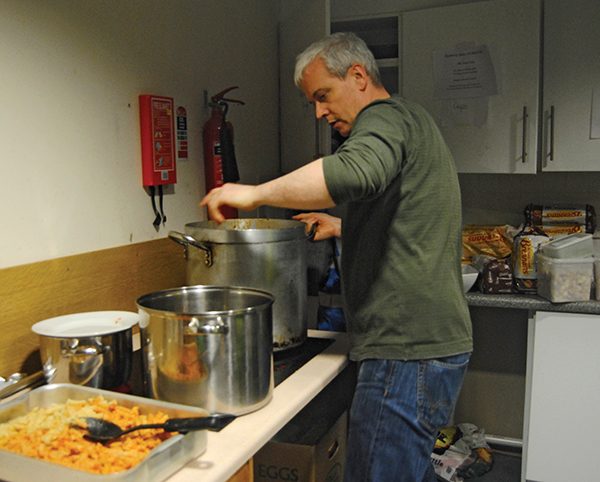
Above: One of the Apollo House volunteers preparing food in the kitchen.
Despite the government’s preoccupation with the amount of emergency ‘beds’ available, these people, the real experts in homelessness, know that it is the context in which these beds are offered that is of vital importance. Do the people availing of these ‘beds’ have any level of privacy and a sense of dignity? Is it a safe and supportive space? Does it provide real, secure accommodation or are residents kicked out onto the streets first thing in the morning? Is the bed in a space wherein a person can tackle addiction? Are there supports available for residents there, a level of regard and care? Is it anything approaching a home? These sorts of questions, questions that have become important nationally in just a few short weeks due to the Home Sweet Home intervention, are of the sort that we should be asking if we are serious in addressing homelessness and addiction in the state. Government mouthpieces going on about the number of ‘beds’ available on any given night is just so much smoke.
Readers will find much in the media regarding the achievements of Home Sweet Home and how it provided a safe and homely space for some of the city homeless this Christmas past. Now that Apollo House is again cold and empty, devoid of the great hope, dedication, laughter and camaraderie of the occupation, it is apparent to me that the initiative has raised the expected standard of homeless accommodation in the state, and it has certainly brought the homelessness debate and, more importantly, the diverse needs of those affected by homelessness, to the fore. It has brought hope and humanity to many who had given up on hope and humanity, and it is something that everyone from volunteers to donors and supporters and, most importantly, Apollo House residents, can be proud of.
For me, just another adopted son of Dublin living in the docklands area of the inner city, who could have as easily himself slipped into the net of homelessness, the Home Sweet Home campaign and the occupation of Apollo House by ordinary citizens for the city’s homeless has finally realised in flesh and bone, and in word and deed, those words that our city has cast in bronze on the plinth of the statue of Jim Larkin on O’Connell Street: “The great appear great because we are on our knees: Let us rise”.
The beacon light of Apollo House has been extinguished, but the Home Sweet Home campaign has only just begun.
By Harry Bradley



